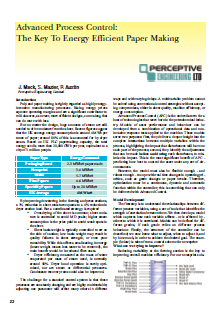- Home
- Industries
- Energy Efficiency

Reducing the Cost of Paper and Board Making
To learn more, please read the article published by the Paper Industry Technical Association.
The manufacture of pulp and paper is one of the most energy-intensive industries in the world. Companies are seeking ways to reduce energy consumption due to competitive pressures or to help meet their commitments on carbon emissions.
Around 80% of that energy is used on paper drying, depending on grammage and grade. Improved dewatering in the forming section will have a big impact on the energy bill, but may come at the cost of sheet quality.
Perceptive Engineering has developed a coordinated approach to this problem. Improving stability of the wet end - with more consistent control of sheet solids and moisture - results in a more uniform sheet entering the dryers. Less steam is required - a 10% reduction was achieved and sustained on 100% recycled fibre news.
Tighter control has been delivered in recycled board, by using Perceptive's Advanced Process Control to balance thickstock flow, dryer steam pressures, and drainage aid chemicals, with the overall aim of improving sheet quality.
Basis weight is controlled far more tightly, offering significant fibre savings. In addition, steam costs were cut by 4.4%; this saving alone provided a rapid payback for the control project.

